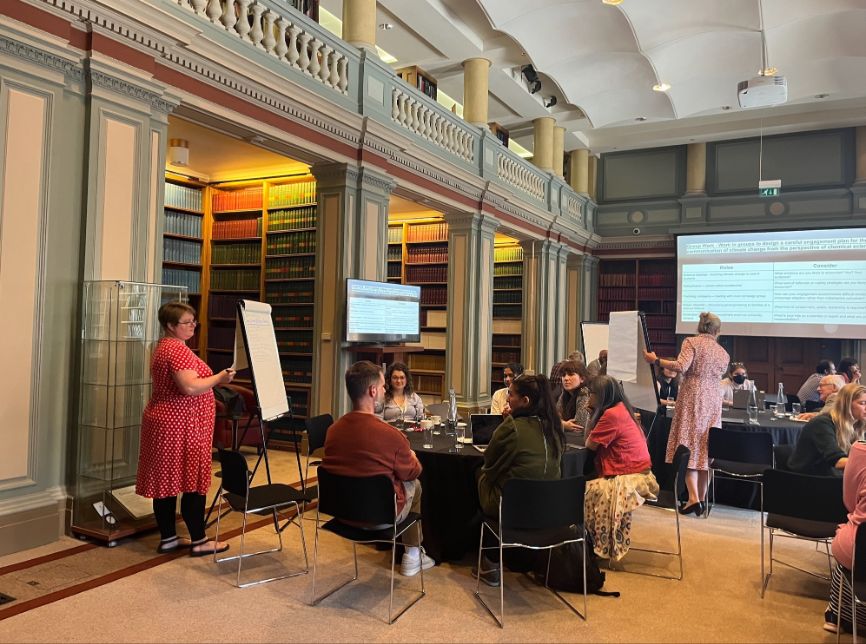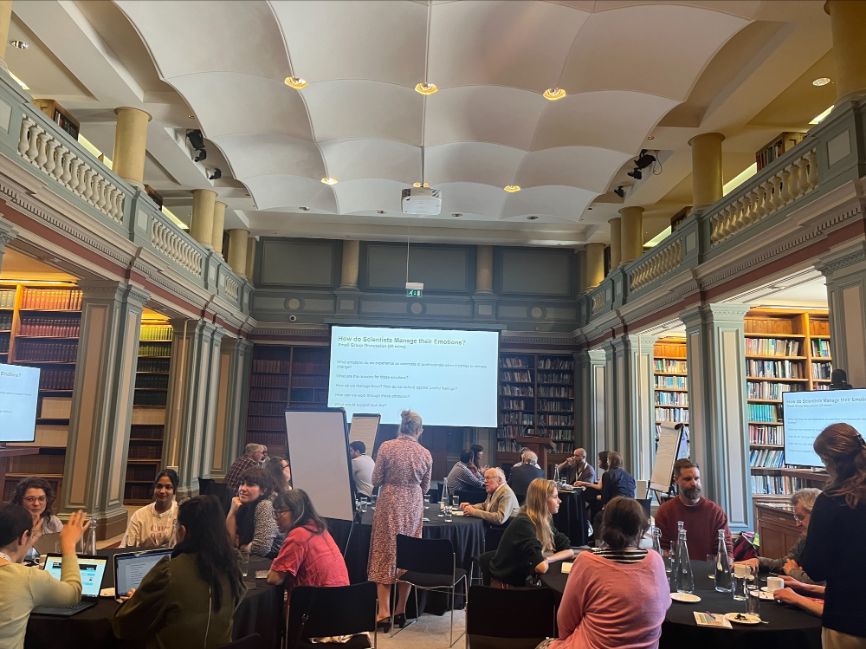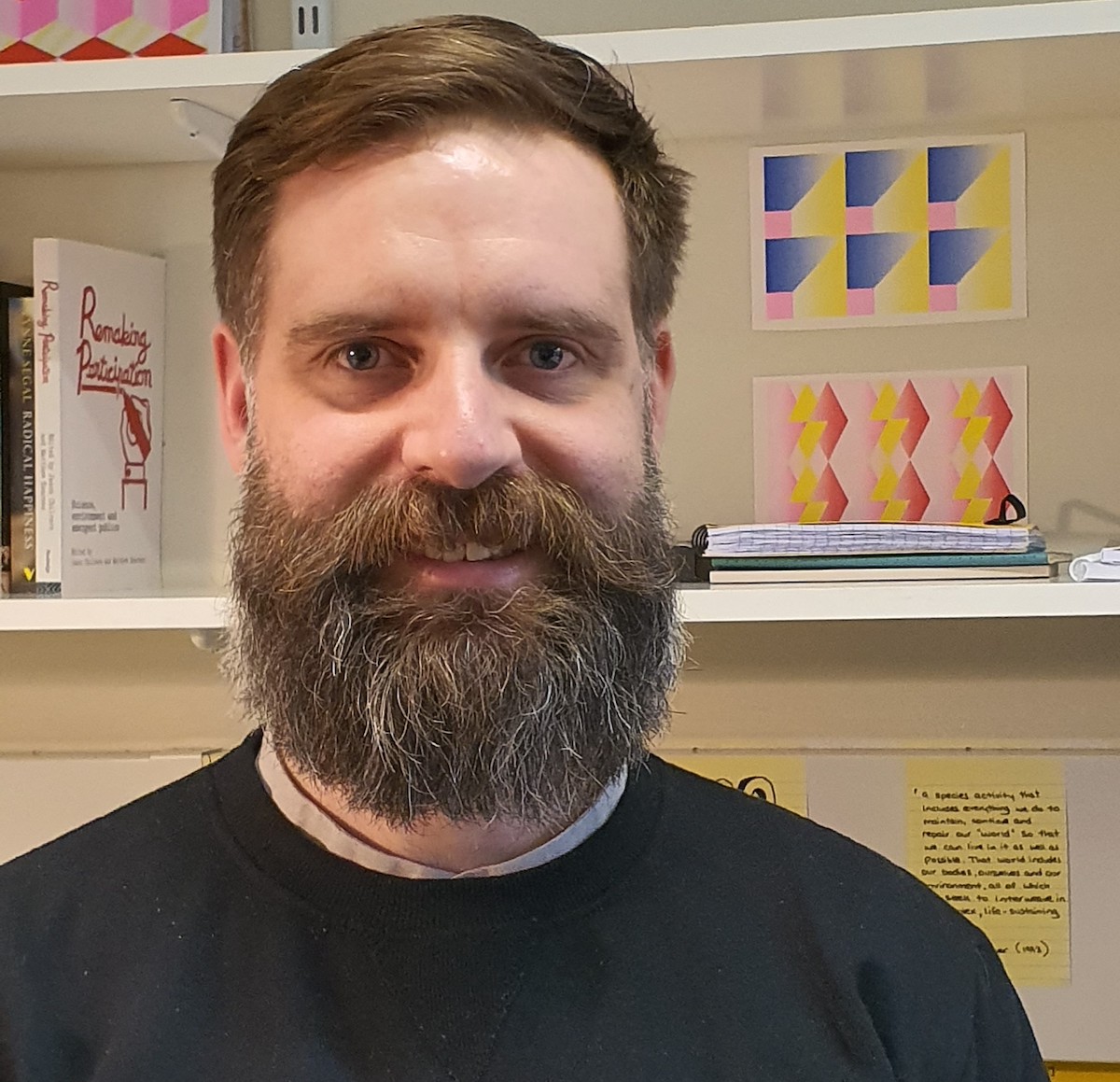Communication and the climate crisis: workshop explores the emotional elements of science

Guests at the Anxious Reactions event at Burlington House Picture: RSC
An emotionally powerful workshop saw dozens of scientists and communicators unite to discuss the challenges and opportunities that come with publicly addressing the climate crisis.
Anxious Reactions was the seventh such hybrid event in our 'Diverse Engagement for Diverse Publics' series. Around 50 people passionately shared their perspectives on communicating the realities of the environmental situation on their mental health and the difficulties in reaching a wider audience with their work.
The workshop, which took place at Burlington House and online, was hosted by Dr Stephen Hughes, a UCL academic who looks at the wider societal impacts of science communication. (A Q&A with Dr Hughes can be found below.) The interactive session featured breakout rooms and brought in research from other fields.
Our Public Engagement team launched the 'Diverse Engagement for Diverse Publics' series in November. It aims to create a safe space and a community for people keen to increase public engagement with science.
One of the main purposes of this latest meeting was to encourage scientists to engage with difficult emotions surrounding climate change. The first discussion topic of the day was about the extent to which scientists show emotion and cry.
Using footage from the 2021 Netflix film Don't Look Up and letters from real-life climate scientists, he showed just some of the range of emotive responses and sentiments conveyed by those with intimate knowledge of the climate change research, with others opening up and sharing their own viewpoints given their emotional investment in their work.
Host Dr Hughes noted that the psychological toll on scientists can be akin to grief and even lead to feelings of burnout, trauma and PTSD. During the 26 May event, he advocated for greater education about these mental challenges and called for improved professional services and institutional cultural change to acknowledge the emotional impact on employees.
The workshop fits in with our ongoing strategic goal to promote and push for environmental sustainability. Dr Hughes acknowledged the leadership role being played by the RSC in the sustainability arena and urged scientists to keep spreading the message about climate change.
Breakout groups brought further sharing of personal experiences, with open and frank discussion flowing about attendees' emotions, the resources they need and their experiences in their day-to-day lives. A second such session also saw participants roleplay to help them understand how to approach producing an engagement plan.
Guests were presented with information on our Outreach Fund, with a particular emphasis on the grants available for sustainability projects. Our Public Engagement team also highlighted the array of volunteering opportunities open for those looking to make a difference.
The workshop came just days prior to the unveiling of another initiative from our Public Engagement team. The RSC has also committed to a partnership with Native Scientists that will see the two organisations work together to promote chemical sciences outreach activities for migrant children.


Q&A with Dr Stephen Hughes
The host of this latest hybrid event, Dr Hughes (pictured) is a Lecturer in Science, Technology and Society, and is Director of UCL's Responsible Innovation short course.
He has built up a body of work looking at the sociological and communications aspects of scientific research and also hosted a previous workshop - Conspiracies: from ChemTrails to Chemophobia. Building Trust with Public Audiences - during the 'Diverse Engagement for Diverse Publics' series.
Here, he talks about this event, the importance of individual and collective action, and how we all can communicate more effectively about the climate crisis.
If you were to sum it up in a couple of sentences, what are the main things you want people to take away from this event?
I would hope that people recognise that there is a huge range of powerful and sometimes uncomfortable emotions involved in coming to terms with the climate crisis – both for scientists and the public – which can lead to some unproductive coping strategies that get in the way of adaptive responses to climate change.
I think that this is ok and totally normal. I think that scientific experts can play an important leadership role through communication and engagement by helping people to acknowledge the painful reality of the situation while offering spaces for communication, containment, and routes for positive action.
What inspired you to organise this workshop? Are there any particular stories or situations that you can think of and that stuck with you that emphasised just how much scientists need something like this?
I’ve always been interested in the emotional aspect of what scientists do, I think because of the obvious contradiction between the fact that science is always seen as something that is totally objective and unemotional and how science is obviously so full of emotion.
Doing science involves frustration, joy, boredom, wonder, passion, and stress. It requires real motivation and emotional investment to care about something so specific – whatever the scientist is working on – for such a long period of time. Then when we think about the joys of discovery or the disappointment of an experiment failing, or the frustration of losing a grant, it seems to me that emotions are everywhere in science.
Then, recently I came across a paper that described the difficult emotions that climate scientists face – the scary reality of climate change, the lack of action from governments, and the constant scrutiny they face from the press and different public groups – and the lack of support that exists for them.
It really struck me how important it is to not only think about the public having strong feelings about climate change but making some space to reflect on how scientists and other professionals experience the issue emotionally.
I decided to approach the issue of public from both directions, looking at the emotional experiences of scientists in the first half of the workshop and then looking at the emotional experiences of the public in the second half, preparing everyone in the room for the kinds of things we need to think about when they come together.
How did you go about devising and preparing this workshop? Is this something brand new or is it based on material that you use in your teaching?
I’ve been working on emotion in public engagement for a while – particularly looking at the issue of difficult and uncomfortable emotions in science communication.
I teach a module on public engagement on our MSc in Science Communication which thinks about engagement as a relationship between scientists and society and as a relationship is full of all the conflicts, difficulties, responsibilities and emotions of any human relationship. We need to think about trust, respect, power imbalances, inclusivity, and the alignment of diverse values.
I built on some of this work but spent a lot more time devising the activities in the workshop in such a way that they worked specifically for chemical scientists and other professionals working in that space.
I drew a lot on work by climate psychologists, particularly those affiliated with the climate psychology alliance. They have fantastic resources available on their website.
Two of your courses at UCL are titled Science Communication and Social Justice, and Engaging the Public with Science. These seem to place a strong emphasis on the need to go beyond looking at issues through a purely scientific lens and thinking more about the societal and sociological impacts – why do you think this is so important for students and those involved in science?
I’m a social scientist so I’m going to say that! But, really, I think that we always need to remember that science is done by human beings who exist in communities and institutions and operate within cultures and traditions like any other social group.
These have an impact on what kind of knowledge that we think is worth pursuing, what kinds of problems are worth solving, and how much of our shared time, money, and resources should go to building that knowledge. I also think that scientists and the work that they produce ought to be publicly and democratically accountable, which means thinking about questions of ethics, responsibility, and communication.
I’d also say that science is amazing at providing reliable knowledge about the way that things are in the world but is not great at answering questions about what we should do. These kinds of questions are best left to the public but in conversation with scientists and scientific institutions.
How important do you believe it is that scientific bodies, academic institutions and learned societies, including the RSC, take a leadership role in dealing with the climate crisis? Is this something you believe individuals can do themselves in their own way too?
I think that the RSC is a great example of leadership in action when it comes to the climate crisis. They have spent a lot of time developing some excellent resources, policies and strategies on how to deal with climate change that is actually quite inspirational.
From a leadership perspective it ticks many of the of the boxes that I discuss in the workshop. I think that it demonstrates that scientists actually care about this issue – not just as impartial producers of knowledge but as a community who are actively participating in change.
Orienting chemical science towards sustainable energy solutions, educating policymakers, and offering wider communication and engagement services are great examples of how committed they are to taking action.
Individuals can certainly do some great work but the really important and effective stuff comes from collective action.
How would you generally the impact the scientific community is having in educating people about the climate crisis? Are there any particular things you have noticed that might explain why some scientists encounter difficulty when they look to talk about climate change?
In terms of education, scientists have done a fantastic job. I think that knowledge or information isn’t the problem, it is how people are able to process that knowledge.
The reality of climate change is scary, people need support in order to deal with the powerful emotions that it can bring about. It creates a lot of tension and conflict in people – on the one hand we want to believe that we can continue doing things as we always have and on the other hand we recognise that properly responding to climate change will require quite drastic responses across society.
This can lead people to deny the full truth of the situation and engage in defensive behaviour that can obstruct the change that is required. In some cases, people will aggressively deny the reality of climate change and project the anger that they are experiencing onto scientists.
At other times, scientists themselves can resort to emotional defences, retreating into the puzzle-like nature of science and cutting off the work that they do from its broader social implications. In this case, communicating about climate change can be quite painful for researchers.
How has the RSC helped or supported you with this workshop and other activities?
The RSC has been wonderful. I’ve received brilliant support from the public engagement and comms team both in designing the workshop and making sure that it aligns both with the vision and aims of the RSC and the needs of its members.
As I mentioned earlier, I think that the RSC is doing wonderful work and taking an inspiring leadership role. I discuss in the workshop that there is potential for the RSC to offer support for scientists themselves who might be struggling with the emotional implications of climate change.
Do you have any quick tips for anyone in the scientific community who wants to do more to change the way they communicate about climate change but who was unable to attend Friday’s session? Are there any resources you would recommend?
I think that recognising that climate change communication is not simply about providing information and knowledge and the issue but also providing meaning. We might think of meaning as information in context.
This context can be the specifical cultural group or community that the audience belongs to and how they might respond to information about climate change (i.e., young children, shareholders of fossil fuel companies, poor or working-class groups), it could be what the communicator believes is at stake in communicating climate change information, or how the implications of the situation are framed.
I think a great place to start is the Climate Psychology Alliance’s Climate Psychology Handbook, which I draw from extensively in the workshop.

Dr Stephen Hughes during the workshop Picture: RSC